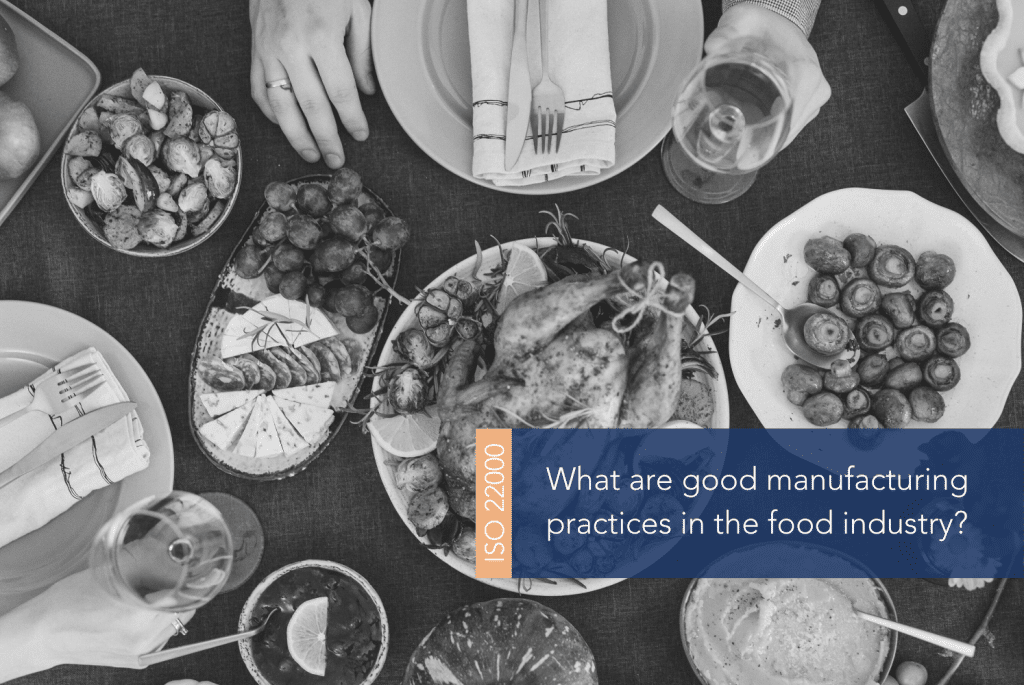
What are good manufacturing practices in the food industry?
June 5th, 2023 By AmywrightThe food industry is one of the most important industries in the world. With the increasing population, the demand for food products is also increasing. However, with the growing demand, the responsibility of ensuring the safety and quality of food products also increases. Implementing Good Manufacturing Practices (GMP) is an essential step towards ensuring the safety and quality of food products.
In this blog, we will discuss what Good Manufacturing Practices (GMP) mean in relation to the food industry and how conforming to GMP can be successful through implementing ISO 22000 food safety management standards.
What are Good Manufacturing Practices (GMP)?
Good Manufacturing Practices (GMP) are guidelines and procedures designed to ensure the safety and quality of food products. These guidelines and procedures apply to all aspects of food production, including food products’ production, processing, packaging, and storage. The main objective of GMP is to reduce the risks associated with food production and ensure that the food products are safe and high-quality.
The implementation of GMP is essential for the food industry for the following reasons:
- Enhancing brand reputation: Companies implementing GMP are perceived as responsible and reliable. This enhances the company’s reputation and improves customer trust.
- Increasing efficiency: Implementing GMP can help companies increase efficiency by reducing wastage, minimising downtime, and improving overall productivity.
- Improving product quality: GMP ensures that food products are high quality and meet customer expectations. This can lead to increased customer satisfaction and loyalty.
What are some of the Good Manufacturing Practices for ensuring food safety?
Some of the Good Manufacturing Practices for ensuring food safety include the following:
Maintain cleanliness: Maintaining cleanliness is vital to ensuring food safety. Proper sanitation practices, including cleaning and sanitising all equipment and surfaces, can help prevent contamination.
Personal hygiene: Employees must follow good hygiene practices, including washing hands frequently and wearing clean clothing, gloves, and hairnets. Workers with illnesses or open wounds should not be allowed to handle food.
Training and education: Proper training and education of employees can ensure they understand the importance of food safety and how to implement GMP.
Equipment maintenance: Regular maintenance and calibration of equipment can ensure that it is functioning correctly and not contributing to contamination.
Raw material control: Proper storage and handling of raw materials can prevent contamination and ensure the equality of the final product.
Record keeping: Accurate record-keeping can help trace the contamination source and identify improvement areas.
Pest control: Proper pest control measures should be implemented to prevent pests from contaminating food products.
Temperature control: Proper temperature control can prevent the growth of harmful bacteria and ensure the safety and quality of food products.
By following these and other GMP, food manufacturers can ensure the safety and quality of their products and protect consumers’ health.
ISO 22000 for food safety management systems
ISO 22000 is an international standard that provides food safety management systems guidelines. The standard is designed to help businesses implement effective food safety management systems and ensure food products are safe for consumption. The standard is based on Hazard Analysis and Critical Control Points (HACCP) principles and incorporates elements of GMP.
While GMP provides guidelines for ensuring food’s safe and hygienic production, ISO 22000 takes a more comprehensive approach to food safety management by addressing the entire food supply chain from raw material procurement to final product delivery.
The standard requires companies to implement a systematic approach to food safety management, which includes the identification of potential hazards, implementing control measures, and monitoring the effectiveness of these measures.
Companies that provide ISO consultancy services can help food companies implement ISO 22000 and GMP. ISO consultants can also provide training and support to help companies maintain compliance with ISO 22000 and GMP.
Implementing GMP is an essential step towards ensuring the safety and quality of food products. GMP provide guidelines and procedures for all aspects of food production, including food products’ production, processing, packaging, and storage. ISO 22000 provides a framework for implementing GMP in the food industry.
I’m interested in ISO 22000 certification; what can I do next?
As a company that provides ISO consultancy services, we can guide you through the certification process and help you implement the necessary systems and processes to meet ISO 22000 requirements. We offer various services, including gap analysis, implementation, internal audits, training, and certification audits.
Don’t hesitate to get in touch with us for more information on how we can help you achieve ISO 22000 certification. Our expert team will happily assist you and answer any questions.

Contact Us
For a free Quotation or Remote presentation by an ISO Specialist, contact us today!
IMSM Ltd Head Office
The Gig House
Oxford Street
Malmesbury
Wiltshire
SN16 9AX